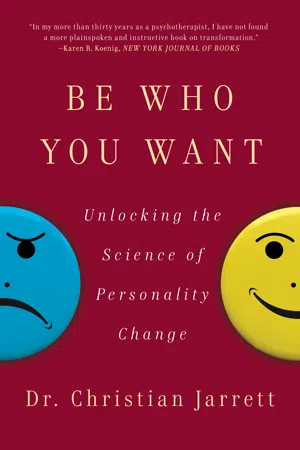
- 304 pages
- English
- ePUB (mobile friendly)
- Available on iOS & Android
About this book
From cognitive neuroscientist Dr. Christian Jarrett, a fascinating book exploring the science of personality and how we can change ourselves for the better. What if you could exploit the plasticity of personality to change yourself in specific ways?Would you choose to become less neurotic? More self-disciplined? Less shy?Until now, we've been told that we're stuck with the personality we were born with: The introvert will never break out of their shell, the narcissist will be forever trapped gazing into the mirror. In Be Who You Want, Dr. Christian Jarrett takes us on a thrilling journey, as he not only explores the ways that life changes us, but shows how we can deliberately shape our personalities to influence the course of our lives. Dr. Jarrett draws on the latest research to provide evidence-based ways to change each of the main five personality traits, including how to become more emotionally stable, extraverted, and open-minded. Dr. Jarrett features compelling stories of people who have achieved profound personality change such as a gang-leader turned youth role model, a drug addict turned ultra-runner, and a cripplingly shy teenager turned Hollywood mega-star. He also delves into the upsides of the so-called Dark Triad of personality traits—narcissism, Machiavellianism, and psychopathy—and how we might exploit their advantages without ourselves going over to the dark side. Filled with quizzes and interactive exercises to help us better understand the various aspects of our personalities, life stories, and passions, Be Who You Want will appeal to anyone who has ever felt constrained by how they've been characterized and wants to pursue lasting change.
Tools to learn more effectively

Saving Books

Keyword Search

Annotating Text

Listen to it instead
Information
Chapter 1 THE WE WITHIN YOU
PLENTY TO HOLD ON TO AND PLENTY WE CAN CHANGE
- Extraversion refers to how receptive you are at a fundamental level to experiencing positive emotions, as well as how sociable, energetic, and active you are. In turn, this affects how much you enjoy seeking out excitement and company. If you like parties, extreme sports, and travel, you most likely score high on this trait.
- Neuroticism describes your sensitivity to negative emotion and your levels of emotional instability. If you worry a lot, if social slights hurt you, if you ruminate about past failures and fret about upcoming challenges, you probably score high on this trait.
- Conscientiousness is about your willpower—how organized and self-disciplined you are, as well as your industriousness. If you like your house to be tidy, you hate being late, and you’re ambitious, you’re probably a high scorer here.
- Agreeability refers to how warm and friendly you are. If you’re patient and forgiving and your first reflex is to like and trust new people you meet, you’re probably highly agreeable.
- Openness is about how receptive you are to new ideas, activities, cultures, and places. If you dislike opera, films with subtitles, and breaking your routine, you’re probably a low scorer.
Big Five Trait | Its Facets (or Subtraits) |
|---|---|
Extraversion | Warm, gregarious, assertive, active, fun-seeking, happy, cheerful |
Neuroticism | Anxious, prone to anger, prone to sadness and shame, self-conscious, impulsive, vulnerable |
Conscientiousness | Competent, orderly, dutiful, ambitious, self-disciplined, cautious |
Agreeability | Trusting, honest, altruistic, accommodating, compliant, modest, empathic |
Openness | Imaginative, aesth... |
Table of contents
- Cover
- Title Page
- Dedication
- Author’s Note
- Chapter 1: The We within You
- Chapter 2: Slings and Arrows
- Chapter 3: Pathological Change
- Chapter 4: Diets, Highs, and Hangovers
- Chapter 5: Choosing to Change
- Chapter 6: Redemption: When Bad People Turn Good
- Chapter 7: Lessons from the Dark Side
- Chapter 8: The 10 Principles of Personal Reinvention
- Epilogue
- Acknowledgments
- About the Author
- Notes
- Index
- Copyright
Frequently asked questions
- Essential is ideal for learners and professionals who enjoy exploring a wide range of subjects. Access the Essential Library with 800,000+ trusted titles and best-sellers across business, personal growth, and the humanities. Includes unlimited reading time and Standard Read Aloud voice.
- Complete: Perfect for advanced learners and researchers needing full, unrestricted access. Unlock 1.4M+ books across hundreds of subjects, including academic and specialized titles. The Complete Plan also includes advanced features like Premium Read Aloud and Research Assistant.
Please note we cannot support devices running on iOS 13 and Android 7 or earlier. Learn more about using the app